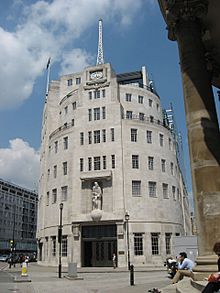BBC Forces Programme facts for kids

The Forces Programme headquarters was at Broadcasting House in London.
|
|
| Country | |
|---|---|
| Headquarters | Broadcasting House, London, England |
| Programming | |
| Language(s) | English |
| Ownership | |
| Owner | BBC |
| History | |
| Launch date | 7 January 1940 |
| Closed | 26 February 1944 |
| Replaced by | BBC General Forces Programme |
The BBC Forces Programme was a special radio station in the United Kingdom. It was created during World War II to entertain and inform British soldiers and sailors. This station broadcast from January 7, 1940, until February 26, 1944. It offered a mix of music, comedy, and news, aiming to boost morale during wartime.
Contents
Radio for Wartime Heroes
Why a New Radio Station?
When World War II began in September 1939, the BBC changed its radio services. It combined its two main channels, the National and Regional programmes, into one called the BBC Home Service.
However, this new Home Service mostly focused on news and serious information. Soldiers and other service members, especially those waiting for action, found it a bit dull. They needed more fun and entertainment. So, in early 1940, the BBC launched the Forces Programme. This new station used some of the old radio frequencies to reach the troops.
What Was On The Air?
The Home Service was put together very quickly. Many popular shows from before the war were missing. It mainly played news, educational programmes, and music. For example, an organist named Sandy MacPherson played light organ music for hours to fill the schedule.
It soon became clear that soldiers, especially those in France, were often bored. They were waiting for battles but had little to do. The BBC Forces Programme was created just for them.
Even though it was for soldiers, people in England could also listen. It quickly became more popular than the Home Service for many listeners. After the Battle of France, the Forces Programme continued to broadcast across the United Kingdom.
The Forces Programme offered a great mix of shows. It had drama, comedy, popular music, quiz shows, and variety acts. It was much more entertaining than the old National Programme. However, it still provided long news updates and important talks.
Some shows were made just for specific groups of service members:
- Ack Ack Beer Beer – for anti-aircraft and barrage balloon stations.
- Garrison Theatre – for the British Army.
- Danger - Men at Work!
- Sincerely Yours, Vera Lynn
- Hi Gang – for all British Armed Forces.
Broadcasting Hours
When it first started, the station was on air from 11:00 AM until 11:00 PM. But from June 16, 1940, the station began broadcasting earlier, at 6:30 AM. It continued until 11:00 PM. These hours stayed the same until a new service, the BBC General Forces Programme, took over in February 1944.
American Influence on the Airwaves
Soldiers from Commonwealth countries also had special broadcasts on the Forces Programme. From 1942, American troops received their own shows too. Popular American variety programmes, like Charlie McCarthy, The Bob Hope Show, and The Jack Benny Program, were heard on the BBC for the first time.
This was a great deal for the British! They only paid $60 for The Bob Hope Show, which cost $12,000 to make. A short daily show about American sports also began. The BBC also re-broadcasted American military shows like Command Performance and Mail Call.
Some people worried that this would make the BBC too "American". But a BBC leader said that most British soldiers would choose American music if they had the choice.
The End of an Era
The BBC Forces Programme ended in February 1944. This was because many American soldiers were arriving in the UK, getting ready for 'D-Day'. These American troops were used to different kinds of entertainment.
So, a new service was created to replace it: the BBC General Forces Programme. This new programme also broadcast on shortwave radio frequencies. These frequencies were used by the Overseas Service, which later became the BBC World Service.
After Victory in Europe Day (VE Day), the frequencies used by the old National Programme were taken over by the new BBC Light Programme.
A Lasting Legacy
The Light Programme, which started after the war, was very different from the pre-war National Programme. It was much more focused on general entertainment. In fact, the Light Programme was like a child of the Forces and General Forces Programme. It had a new style of radio presentation and programming that had not existed in the United Kingdom before the war. It showed how much wartime radio had changed what people wanted to hear.
 | Kyle Baker |
 | Joseph Yoakum |
 | Laura Wheeler Waring |
 | Henry Ossawa Tanner |

